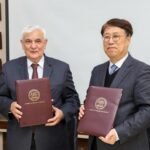
LG Electronics Inc. is making swift gains in the global market for artificial intelligence-ready data center cooling systems, boosted by fresh deals in Saudi Arabia and the US.
People familiar with the matter said on Thursday that the South Korean tech giant is expected to supply large-scale cooling systems for an AI data center under construction in Oxagon, the centerpiece industrial complex of the oil kingdom’s Neom megacity project.
LG executives, including LG Electronics Chief Executive Cho Joo-wan, recently traveled to the Middle Eastern country to meet with a Saudi-based data center developer and signed a memorandum of understanding to provide LG’s cooling solutions for the AI data center, the people said.
Financial terms weren’t disclosed, but the deal is expected to pave the way for follow-up contracts worth several hundred billion won, or hundreds of millions of dollars, over the mid to long term, given the global recognition of LG’s cooling solution technologies.
Oxagon, a floating octagon-shaped hub off the Red Sea, is a core part of Saudi Crown Prince Mohammed bin Salman’s $500 billion Neom project to wean the kingdom off fossil fuels, with the data center anchoring its push for a sustainable, data-driven economy.

In February, Saudi Arabia-based DataVolt secured a contract from Neom to build a carbon-neutral AI data center in Oxagon, with $5 billion earmarked through 2028 for the first phase to build a 1.5-gigawatt data center designed with diverse computing densities and energy-efficient architecture.
Cooling systems are critical for data centers running AI accelerators and other high-performance chips, which generate immense heat.
Global tech firms, including Nvidia Corp., are investing heavily in advanced cooling technologies, from liquid-immersion systems to enhanced air cooling.
A NEW US DEAL
On Thursday, LG Electronics CEO Cho also said on social media that the company has won a deal to supply a large-scale cooling system for a data center under development in the US.
The client and the deal size weren’t disclosed, though the contract is reportedly valued at several tens of billions of won, or tens of millions of dollars.
It marks LG’s first publicly announced data-center cooling project in the US.
The company has already signed multiple similar deals to supply its heating, ventilation and air conditioning (HVAC) systems to facilities abroad, including logistics centers in Singapore and AI data centers in Indonesia and Vietnam in partnership with its IT service sibling LG CNS Co.

Cho said the US deal demonstrates the Korean tech giant’s technological prowess and its ability to meet the stringent requirements of global AI infrastructure.
It has also been in talks to provide HVAC systems to Microsoft Corp.’s data centers and recently passed qualification tests with Nvidia for liquid cooling solutions.
Analysts say the US deal underlines LG’s technological competitiveness and could strengthen its position in the AI-related downstream industry, where American tech giants are racing to expand data center capacity.
A GROWING COOLING ARSENAL
The Korean electronics giant is expanding its portfolio beyond conventional air-based cooling systems for data centers to include liquid-based solutions.
Its Coolant Distribution Unit (CDU), equipped with high-efficiency inverter pumps and modular design, manages coolant flow and temperature across multiple servers to boost energy efficiency and reduce costs.
The company is also introducing cold plate technology, which attaches directly to high-powered processors to handle next-generation thermal loads in AI data servers.
These innovations are expected to position LG to compete in a market increasingly moving toward liquid cooling, which offers better thermal efficiency and scalability than traditional air systems, according to the company.

Industry experts see advanced cooling as more than support infrastructure, calling it a driver of sustainability and efficiency in the data economy.
EXPLODING MARKET POTENTIAL
According to the International Energy Agency (IEA), data centers currently consume between 1% to 1.3% of global electricity demand.
With the rapid rise of generative AI, power consumption is expected to climb steeply in the coming decade, intensifying pressure to adopt more efficient and sustainable cooling.
The global market for data center liquid cooling is projected to grow from $5.65 billion in 2024 to $48.42 billion by 2034, according to Research and Markets.
Growth is being driven by demand for energy-efficient solutions to power high-performance computing, AI and hyperscale facilities, along with the adoption of immersion and direct-to-chip cooling.
“LG is asserting itself as a key supplier in the cooling solutions market at the forefront of the AI industry,” said an LG official.
“Our chiller sales could reach 1 trillion won within two years.”
By Jeong-Soo Hwang and Eui-Myung Park
hjs@hankyung.com
Sookyung Seo edited this article.















